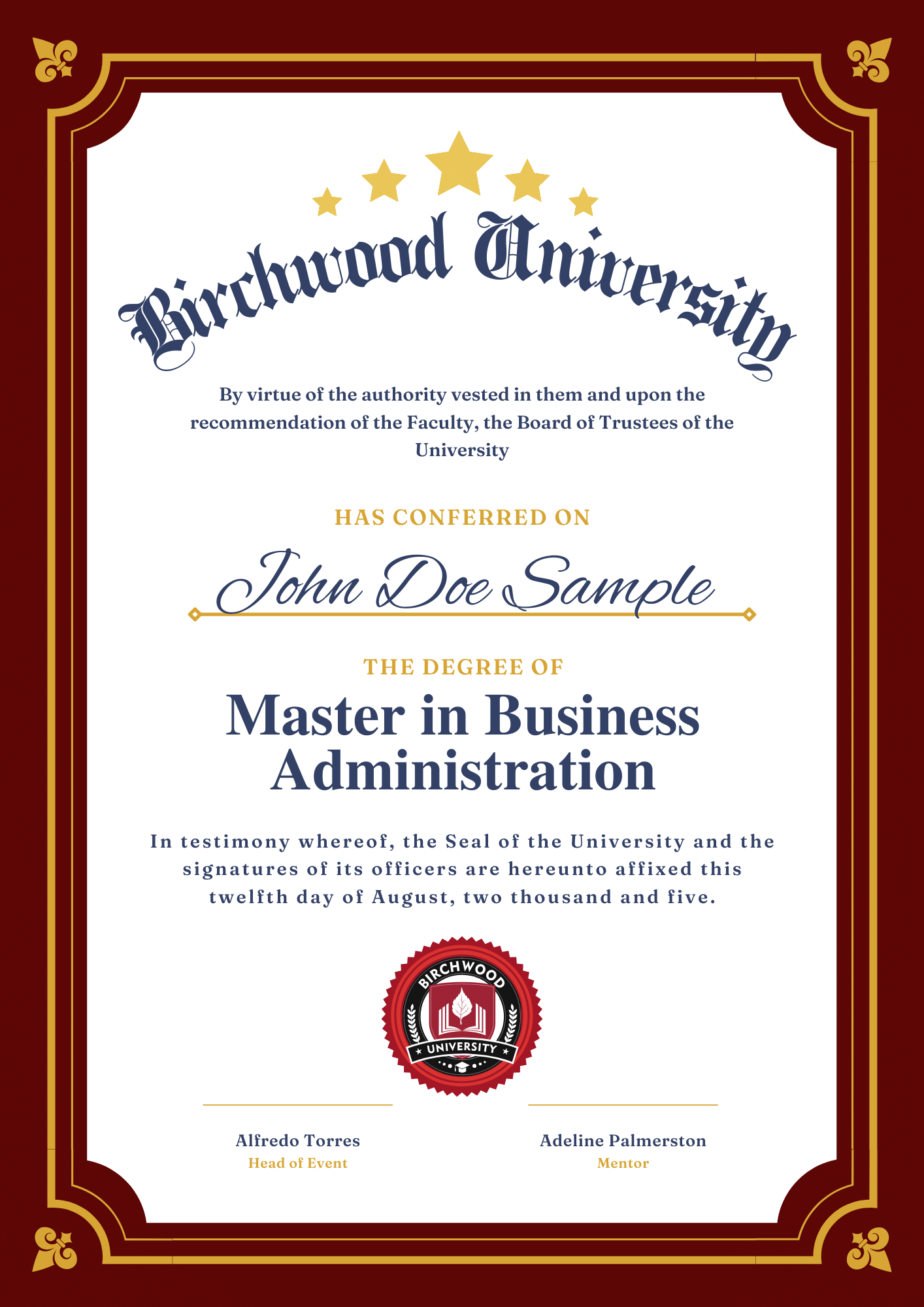A Master’s Degree in Business Administration (MBA) equips individuals with advanced business skills and knowledge. It prepares graduates for leadership roles across various industries.
An MBA program offers comprehensive training in essential areas like finance, marketing, and management. Students gain critical thinking and strategic decision-making skills, preparing them for complex business challenges. Many programs emphasize real-world experience, often including case studies, internships, and networking opportunities.
Graduates emerge with enhanced leadership abilities, making them attractive to employers. The degree fosters a strong understanding of global business dynamics and ethical practices. Pursuing an MBA can also lead to higher earning potential and career advancement. As businesses evolve, an MBA remains a valuable asset for those aiming to excel in today’s competitive landscape.
Master’s Degree in Business Administration

Table of Contents
What Is An Mba?
The Master’s Degree in Business Administration, or MBA, is a popular choice for many students. An MBA provides advanced knowledge in business and management. This degree helps individuals develop skills to lead organizations effectively. Graduates often pursue high-level positions in various industries. Understanding what an MBA entails is essential for anyone considering this path.
Key Features
Key features of an MBA program make it unique and valuable. Here are some important aspects:
- Comprehensive Curriculum: Courses cover finance, marketing, operations, and leadership.
- Networking Opportunities: Students connect with industry leaders and peers.
- Hands-on Learning: Programs often include case studies and real-world projects.
- Flexible Scheduling: Many schools offer part-time and online options.
Many programs also focus on soft skills. These skills include communication, teamwork, and problem-solving. MBA graduates often emerge as strong leaders. The table below highlights the essential features:
| Feature | Description |
|---|---|
| Curriculum | Courses in various business fields |
| Networking | Build connections with professionals |
| Learning Style | Interactive and practical methods |
| Flexibility | Part-time and online options available |
Types Of Programs
Various types of MBA programs cater to different needs. Each program has unique features and benefits. Here are the most common types:
- Full-Time MBA: Typically a two-year program. Students attend classes on campus.
- Part-Time MBA: Designed for working professionals. Classes are scheduled in the evenings or weekends.
- Online MBA: Offers flexibility for students. Courses are completed entirely online.
- Executive MBA (EMBA): Tailored for experienced professionals. Focuses on leadership and advanced business strategies.
Each program type has its own advantages. Full-time MBAs often provide a more immersive experience. Part-time and online options allow for continued work while studying. The choice depends on personal needs and career goals.
Benefits Of An Mba
The Master’s Degree in Business Administration (MBA) offers many benefits. It helps people grow in their careers and gain valuable skills. An MBA can open doors to new opportunities and make you stand out. This degree is more than just a piece of paper. It prepares you for the fast-paced world of business.
Career Advancement
One of the biggest benefits of an MBA is career advancement. Many companies prefer candidates with this degree. An MBA gives you a deeper understanding of business concepts. You learn about finance, marketing, and management. This knowledge can help you climb the corporate ladder.
Here are some ways an MBA can boost your career:
- Higher Salary: MBA graduates often earn more than those with only a bachelor’s degree.
- Promotions: Many organizations promote employees with advanced degrees faster.
- Leadership Roles: An MBA prepares you for leadership and managerial positions.
| Degree Type | Average Salary |
|---|---|
| Bachelor’s Degree | $50,000 |
| MBA | $80,000 |
Many top companies seek MBA graduates for their strategic thinking and problem-solving skills. In today’s business world, having an MBA can be a game-changer. It sets you apart from your peers.
Networking Opportunities
An MBA also provides networking opportunities. You meet people from various industries and backgrounds. These connections can lead to job offers or collaborations. Networking helps you build relationships that last a lifetime.
Here are some ways networking can benefit you:
- Career Connections: Meet future employers or business partners.
- Mentorship: Find mentors who can guide your career path.
- Knowledge Sharing: Gain insights from experienced professionals.
Many MBA programs host events, workshops, and seminars. You can interact with industry leaders and alumni. This interaction creates a strong network. You can share ideas and learn from others.
Overall, the networking aspect of an MBA is crucial. It not only enhances your career but also enriches your professional life.
Admission Requirements
A Master’s Degree in Business Administration (MBA) opens doors to many career opportunities. It helps in developing essential skills like leadership and strategic thinking. Admission requirements vary by school but generally involve a few key steps. Understanding these requirements is crucial for a successful application.
Application Process
The application process for an MBA program can seem overwhelming. However, breaking it down into steps makes it easier. Here is a simple guide to help you navigate through:
- Research Programs: Look for schools that fit your career goals.
- Prepare Documents: Gather transcripts, resumes, and letters of recommendation.
- Write Essays: Craft compelling personal statements that reflect your goals.
- Submit Application: Follow each school’s specific guidelines.
- Interview: Prepare for possible interviews with admission committees.
Here’s a quick overview of common documents needed:
| Document | Description |
|---|---|
| Transcripts | Official records from previous schools. |
| Resume | A summary of your work experience and skills. |
| Letters of Recommendation | Recommendations from employers or professors. |
| Essays | Personal statements detailing your motivations. |
Each school may have specific requirements, so check their websites. A well-prepared application can make a big difference.
Standardized Tests
Many MBA programs require standardized tests. These tests measure your skills in areas like math and verbal reasoning. The most common test is the GMAT (Graduate Management Admission Test). Some schools accept the GRE (Graduate Record Examination) too.
- GMAT: Focuses on analytical writing and problem-solving.
- GRE: Includes verbal reasoning and quantitative reasoning.
Scores from these tests can significantly impact your application. Below is a table showing average score ranges for top MBA programs:
| Test | Average Score Range |
|---|---|
| GMAT | 600 – 740 |
| GRE | 300 – 320 |
Preparing for these tests is essential. Many resources are available, including prep courses and practice tests. Doing well can boost your chances of admission.
Curriculum Breakdown
The Master’s Degree in Business Administration (MBA) offers a comprehensive education in various business disciplines. The curriculum breakdown consists of core courses and elective options. This structure helps students gain essential skills and knowledge. Understanding this curriculum is key for prospective MBA students.
Core Courses
Core courses form the foundation of the MBA program. These classes ensure every student learns vital business concepts. Students typically take these classes in their first year. Here’s a list of common core courses:
- Financial Accounting: Understanding financial statements and their implications.
- Marketing Management: Learning strategies to promote products and services.
- Operations Management: Focusing on improving business processes.
- Managerial Economics: Applying economic theory to business decisions.
- Organizational Behavior: Studying how individuals behave in organizations.
These courses prepare students for real-world challenges. Each course emphasizes critical thinking and problem-solving skills. Below is a table summarizing these core courses:
| Course Title | Key Focus |
|---|---|
| Financial Accounting | Financial statements and analysis |
| Marketing Management | Strategies for effective marketing |
| Operations Management | Enhancing efficiency in operations |
| Managerial Economics | Economic principles in business |
| Organizational Behavior | Human behavior in organizations |
Elective Options
Elective options allow students to customize their MBA experience. Students can choose courses based on their interests. This flexibility enables specialization in specific areas. Popular elective options include:
- Entrepreneurship: Building and managing new ventures.
- International Business: Navigating global markets and cultures.
- Data Analytics: Using data to drive business decisions.
- Human Resources Management: Managing employee relations and benefits.
- Supply Chain Management: Overseeing product flow from suppliers to customers.
These electives enhance skills and prepare students for various careers. Students can pursue their passions while gaining valuable knowledge. Below is a table highlighting popular electives:
| Elective Title | Key Focus |
|---|---|
| Entrepreneurship | Creating and managing startups |
| International Business | Global market strategies |
| Data Analytics | Data-driven decision making |
| Human Resources Management | Workforce management and development |
| Supply Chain Management | Logistics and operations |
Specializations Available
A Master’s Degree in Business Administration (MBA) offers many exciting specializations. These specializations help students focus on specific areas of interest. Choosing a specialization can shape your career. It opens doors to unique job opportunities. Students can tailor their studies to meet their goals.
Finance
Finance is a popular specialization in an MBA program. It focuses on managing money and investments. Students learn how to analyze financial data and make smart decisions. This specialization prepares you for many roles in the financial world.
Key topics in Finance include:
- Investment Management
- Corporate Finance
- Risk Management
- Financial Markets
Popular career paths in Finance:
- Financial Analyst
- Investment Banker
- Risk Manager
- Financial Consultant
The table below shows the average salary for finance professionals:
| Job Title | Average Salary |
|---|---|
| Financial Analyst | $85,000 |
| Investment Banker | $100,000 |
| Risk Manager | $90,000 |
| Financial Consultant | $80,000 |
This specialization offers strong job prospects. It equips students with skills to thrive in finance.
Marketing
Marketing is another exciting specialization in an MBA program. It deals with promoting products and services. Students learn how to understand customer needs and market trends. This specialization is vital for businesses aiming for success.
Core topics in Marketing include:
- Digital Marketing
- Brand Management
- Consumer Behavior
- Marketing Strategy
Common career opportunities in Marketing:
- Marketing Manager
- Brand Strategist
- Market Research Analyst
- Social Media Manager
Here is a table showing average salaries for marketing professionals:
| Job Title | Average Salary |
|---|---|
| Marketing Manager | $95,000 |
| Brand Strategist | $85,000 |
| Market Research Analyst | $70,000 |
| Social Media Manager | $65,000 |
Marketing graduates have many career paths. They can work in various industries.
Online Vs. On-campus
Choosing between an online and on-campus Master’s Degree in Business Administration (MBA) is a big decision. Each option offers unique benefits and challenges. Many students want to know which format fits their lifestyle and career goals better. Understanding these differences can help you make a smart choice.
Pros And Cons
Both online and on-campus MBA programs have their advantages and disadvantages. Here’s a quick breakdown:
| Feature | Online MBA | On-Campus MBA |
|---|---|---|
| Flexibility | Can study anytime, anywhere | Fixed class schedules |
| Networking | Limited face-to-face connections | Strong networking opportunities |
| Cost | Often more affordable | Higher tuition and commuting costs |
| Learning Style | Self-paced learning | Structured classroom environment |
Online MBA pros:
- Study at your own pace.
- Access to more schools worldwide.
- No need for daily commuting.
Online MBA cons:
- Less interaction with professors.
- Requires strong self-discipline.
On-Campus MBA pros:
- In-person classes enhance learning.
- Build close relationships with peers.
On-Campus MBA cons:
- Less flexible schedule.
- Higher overall costs.
Learning Environment
The learning environment plays a key role in your MBA experience. Online and on-campus formats offer different settings.
Online programs provide a digital space for learning. You can access materials from anywhere. This option suits busy professionals. It allows you to balance work, family, and study. However, it may feel isolating. You miss the social aspects of a classroom.
On-campus programs create a lively atmosphere. Students attend lectures, participate in discussions, and engage with peers. This face-to-face interaction fosters teamwork and collaboration. You can join clubs and attend events, enhancing your experience.
Key differences in learning environments:
- Online: Flexible, self-directed, and technology-driven.
- On-Campus: Structured, interactive, and socially engaging.
Ultimately, your choice depends on your learning style. Consider what environment helps you learn best. Each option can lead to a successful MBA journey.
Cost Of An Mba
A Master’s Degree in Business Administration (MBA) can open many doors. It boosts your career and increases earning potential. However, the cost of an MBA often raises questions. Understanding the expenses involved helps in planning your future. This section will explore tuition fees and financial aid options.
Tuition Fees
The tuition fees for an MBA program vary widely. Costs depend on the school, location, and program type. Here’s a breakdown of average tuition fees:
| Type of Institution | Average Tuition (per year) |
|---|---|
| Public University | $20,000 – $40,000 |
| Private University | $40,000 – $70,000 |
| Online Programs | $15,000 – $30,000 |
Here are some key factors that can influence tuition costs:
- Location: Cities often charge more.
- Reputation: Well-known schools may be pricier.
- Program Length: Longer programs usually cost more.
In addition to tuition, consider other expenses:
- Books and supplies
- Housing costs
- Transportation
- Food expenses
Estimating the total cost helps in making informed decisions.
Financial Aid Options
Many students seek financial aid to help with MBA costs. Several options are available to ease the financial burden:
- Scholarships: These do not require repayment. Many schools offer merit-based or need-based scholarships.
- Grants: Like scholarships, grants are funds you don’t repay. They usually depend on financial need.
- Loans: Students can take loans to cover costs. Federal loans often have lower interest rates.
- Work-Study Programs: These let students work part-time while studying to earn money for tuition.
Students should also check for employer sponsorship. Some companies pay for further education to develop skills. Always research and apply for multiple options. Taking time to explore can lead to significant savings.

Career Paths Post-mba
A Master’s Degree in Business Administration (MBA) opens doors to many exciting career paths. Graduates gain valuable skills in leadership, finance, marketing, and strategy. This degree prepares individuals for high-demand roles in various sectors. Post-MBA, many professionals explore consulting or entrepreneurship. Both paths offer unique challenges and rewards, allowing graduates to thrive in dynamic environments.
Consulting
Consulting is a popular career path for MBA graduates. Consultants help businesses solve problems and improve performance. They work with various industries, providing expert advice. Here are some key aspects of a consulting career:
- Problem Solving: Consultants analyze complex issues and suggest solutions.
- Industry Knowledge: They often specialize in specific sectors like healthcare or technology.
- Networking: Building connections is vital for gaining clients and insights.
- Team Collaboration: Consultants frequently work in teams to tackle projects.
Consulting firms often seek candidates with strong analytical skills and communication abilities. Graduates from top MBA programs can secure positions in renowned companies. Here’s a simple table showing popular consulting firms and their focus areas:
| Consulting Firm | Focus Area |
|---|---|
| McKinsey & Company | Strategy & Management |
| Bain & Company | Private Equity & Retail |
| Boston Consulting Group (BCG) | Corporate Strategy |
Entrepreneurship
Entrepreneurship is another exciting path for MBA graduates. Many choose to start their own businesses. This route offers flexibility and the chance to innovate. Entrepreneurs create products or services to meet market needs. They can also solve problems in their communities. Here are some reasons why entrepreneurship is appealing:
- Creative Freedom: Entrepreneurs can bring their ideas to life.
- Financial Potential: Successful businesses can generate significant income.
- Impact: Entrepreneurs can influence society through their solutions.
- Self-Development: Starting a business fosters personal growth and resilience.
Starting a business requires careful planning. A solid business plan is essential for success. Here is a simple list of steps to consider:
- Identify your business idea.
- Conduct market research.
- Write a business plan.
- Secure funding.
- Launch your business.
With determination and skills gained from an MBA, entrepreneurs can achieve great success.

Conclusion
A Master’s Degree in Business Administration opens doors to numerous career opportunities. Graduates gain essential skills in leadership and strategic thinking. This degree enhances earning potential and professional growth. Investing in your education can lead to a rewarding future. Embrace the journey, and unlock your potential in the business world.

